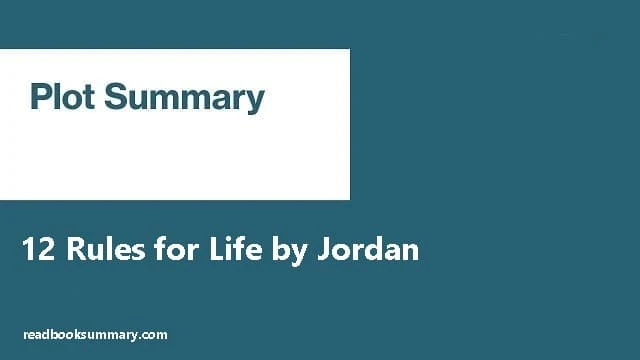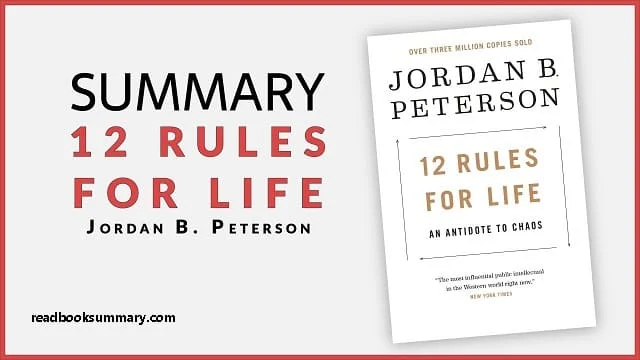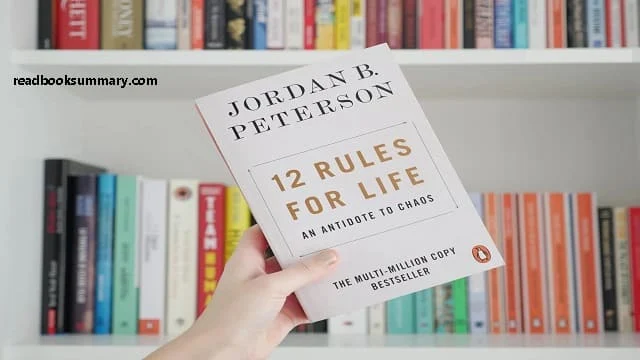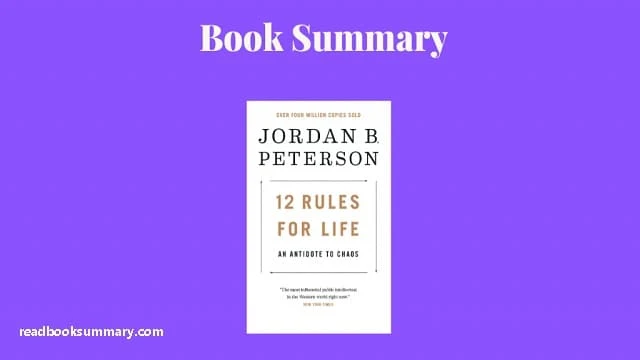12 Rules for Life Summary. 12 Rules for Life: An Antidote to Chaos is 2018 self-help book by the Canadian clinical psychologist Jordan Peterson. It provides life advice through essays in abstract ethical principles, psychology, mythology, religion, and personal anecdotes. In the book, Peterson offers practical advice for how to navigate the complexities of life and find meaning and purpose.
The book topped bestseller lists in Canada, the United States, and the United Kingdom, and had sold over five million copies worldwide by the end of 2020. Peterson went on a world tour to promote the book, receiving much attention following an interview with Channel 4 News. The book is written in a more accessible style than his previous academic book, Maps of Meaning: The Architecture of Belief (1999). A sequel, Beyond Order: 12 More Rules for Life, was published in March 2021.
 |
| 12 Rules for Life Summary |
12 Rules for Life Summary
The book opens with a foreword by Peterson’s friend and colleague, Dr. Norman Doidge, and an Overture written by Peterson himself. Twelve chapters then present the titular “rules for life”: “Stand up straight with your shoulders back,” “Treat yourself like someone you are responsible for helping,” “Make friends with people who want the best for you,” “Compare yourself to who you were yesterday, not to who someone else is today,” “Do not let your children do anything that makes you dislike them,” “Set your house in perfect order before you criticize the world,” “Pursue what is meaningful (not what is expedient),” “Tell the truth—or, at least, don’t lie,”
“Assume that the person you are listening to might know something you don’t,” “Be precise in your speech,” “Do not bother children when they are skateboarding,” and “Pet a cat when you encounter one on the street.” The book then ends with Peterson’s “Coda,” as well as notes and an index. An illustration accompanies each chapter. They are simple line drawings and often feature the same children—a young boy and a young girl. Raising children is an important theme in the book, for they represent the direction in which society will go.
While some of the rules are quite literal, others are metaphorical, or at least tongue-in-cheek expressions to present a more practical and widely applicable idea. The rules focus on personal reflection and behavior. Peterson fears the destructive powers of ideologues and aims to present tools for developing personal character and a moral compass that can carry people through the uncertainties in a world of sweeping social change.
The book is for millennials—a generation that Peterson believes has been forced into habits of destructive moral relativism that leads them to lack convictions in the face of diversity, and into nihilism, a mode of thinking that essentially casts life as meaningless and rejects all ideas of truth. Peterson’s personal political lean and observations of the world around him lead him to characterize the world in this way and imagine the antidote as a path, forged by habits and decisions, that neither blindly accepts nor rejects philosophies, worldviews, and other influences, but that leads to a meaningful sense of self and productive march through life.
Each chapter features personal anecdotes and references to academic works, historical examples, or, most frequently, Biblical stories. Peterson cites sources in endnotes, but since this is not a peer-reviewed book published by an academic press, he does not cite all of his sources or always reference evidence for his arguments.
Peterson prides himself on being blunt and abandoning a concern for political correctness. He wrote this book in his own voice and presents it as universal wisdom that can reverse a person’s destructive path through life and work towards something more productive and successful by the standards and values that he presents in his work.
You may also like to read: 1984 Book Summary
12 Rules for Life Themes
Pay attention. Fix what you can fix. Don’t be arrogant in your knowledge. Strive for humility, because totalitarian pride manifests itself in intolerance, oppression, torture, and death. Becomes aware of your own insufficiency—your cowardice, malevolence, resentment and hatred.
Consider the murderousness of your own spirit before you dare accuse others, and before you attempt to repair the fabric of the world. Maybe it’s not the world that’s at fault. Maybe it’s you. You’ve failed to make the mark. You’ve missed the target. You’ve fallen short of the glory of God. You’ve sinned. And all of that is your contribution to the insufficiency and evil of the world. And, above all, don’t lie. Don’t lie about anything, ever. Lying leads to Hell (198).
You may also like to read: 12 Rules for Life Quotes
 |
| synopsis of 12 rules for life |
 |
| 12 rules for life book summary |
 |
| 12 rules of life summary |
 |
| 12 rules for life jordan peterson summary |
 |
| jordan peterson 12 rules for life summary |
Questions and Answers about 12 Rules for Life Plot
Is 12 Rules of life worth reading? The success of the book and the “academic rock star” status it's author has achieved recently suggest just how far we have gone off track in teaching the young about life, when such aphorisms come as revelations to many. Still, 12 Rules for Life is a very good book, and one that many people could benefit from reading.
Is 12 Rules for Life hard? This is one of the most difficult lessons of life. It is far better to render Beings in your care competent than to protect them. Because these really are rules. And the foremost rule is that you must take responsibility for your own life.
What is the concept of life rules? A rule of life is a commitment to live your life in a particular way. It is meant to be crafted with prayer and discernment, in partnership with God, as you consider the way God made you and the values He has inscribed upon your heart.
What is Rule 1 Summary 12 Rules for Life? Rule 1: Stand Up Straight With Your Shoulders Back. The poor and stressed always die first, and in greater numbers. They are also much more susceptible to non-infectious diseases, such as cancer, diabetes and heart disease.
What is Rule 11 in 12 rules? “Do Not Bother Children When They Are Skateboarding.” That is Rule 11 in Jordan Peterson's bestseller 12 Rules for Life: An Antidote to Chaos. Peterson explores how skateboarding is a way for boys to test danger and learn to deal with risk and pain, and as such is a valuable source of socialization and psychic health.
What are the 4 basic rules of life? 4 Rules in Life: Be Impeccable with your word, Don't take anything personally, Don't make assumption, and Always do your best.
What is Rule 7 in 12 Rules for Life? The main idea is that pursuing pleasure is a reflection of a lack of purpose, meaning and direction. The way forward is to take responsibility, pay attention, and strive for humility and utility (adding value) in your life.
What is the 1% rule in life? Getting better by just 1% consistently can build to tremendous improvements, and over time can make a big difference to our success. It's called the principle of 'aggregate marginal gains', and is the idea that if you improve by just 1% consistently, those small gains will add up to remarkable improvement.
What is Rule 9 in 12 Rules for Life? Rule 9: Assume that the person you are listening to might know something you don't. The author describes the virtue in living your life by engaging with others through meaningful conversation. The main problem is that most conversations are one-sided, often with each expressing a fixed perspective.
What is Rule 10 in 12 rules? In 12 Rules for Life, Rule #10 is “Be Precise In Your Speech.” What does this mean? In summary, Jordan Peterson's Rule 10 instructs you to define problems exactly. Don't just leave a problem as a vague, diffuse issue. This will keep you irritated and anxious.
What is Rule 8 in 12 rules? In 12 Rules for Life, Rule 8 is “Tell The Truth – Or At Least Don't Lie.” What does this mean? Why is lying so bad to yourself? Why is telling the truth so good? This rule discusses not only lying to others, but also lying to yourself and obscuring your personal truth.
What is Rule 6 in 12 more rules for life? Rule 6: Cast Ideologies Aside, Beware of ideologies that assign a single cause (e.g. power, sex, money) for a complex problem. The reality is never so simple. Abandon ideologies and stop looking for external factors to blame. Instead, look inward and take responsibility for your situation.
